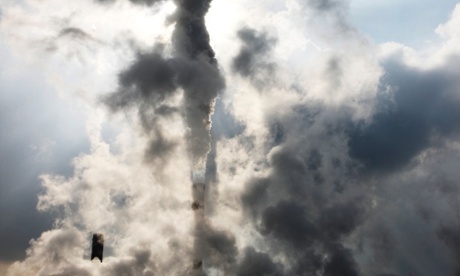
The federal and state governments have agreed to work together to improve air quality standards and help Australia adapt to the effects of climate change.
After a meeting on Thursday, environment ministers released a discussion paper for a national clean air agreement proposing stronger air quality standards for sulphur dioxide, nitrogen dioxide and ozone, tackling the release of mercury into the environment and curbing shipping emissions.
While the paper stressed that Australia’s air quality is “very good” compared with the rest of the world, the health costs of air pollution cost the country up to $24.3bn a year. Around 2.2% of hospital emissions for children aged under 14 with respiratory problems are due to PM10, a type of particulate released by burning fuels.
There will also be a review of fuel quality standards and measures to control emissions from wood heaters and non-road spark ignition engines. The exact level of these standards has yet to be thrashed out by the governments.
A climate change adaption working group has been established, to be chaired by Lisa Neville, Victoria’s environment minister. The group, which will involve all the states, will work on issues such as water management and renewable energy opportunities.
The inclusion of sulphur dioxide (SO2) in the review has been welcomed by some residents in the Victorian town of Anglesea, who have fought a lengthy campaign against the Alcoa coal mine and power plant, which sits just 1km from a primary school.
Surf Coast Air Action, a community environment group, claims that residents are at risk from the 39,000 tonnes of SO2 pumped out by the plant, citing evidence that it worsens asthma and contributes to heart and lung diseases.
“It’s good news that slowly but surely it’s being recognised that current standards do not protect human health,” said Dr Jacinta Morahan, of the air action group. Morahan removed her own children from the school that sits next to the mine.
“ I think [federal environment minister] Greg Hunt is to be commended for including SO2. It’s a real risk to people and there is community concern here about its impact, as well as the coal dust. At the moment, Alcoa can just say they are meeting the standards so nothing changes.”
Federal Liberal MP Sarah Henderson, whose electorate includes Anglesea, told Guardian Australia she had lobbied Hunt to include the review of SO2.
“My job is to be a strong advocate for the communities I represent and there’s no doubt there’s strong concern about Alcoa’s power plant,” said Henderson, who describes herself as a “strong environmentalist.”
“I’ve been very disappointed that Alcoa haven’t invested in sulphur dioxide scrubbers.
“If we had our time again, the Anglesea coal fired power station would not be built where it is. Developing a coal mine in a pristine part of the world is not a decision governments would make these days.”
Neville said there was “room for improvement” in air quality measures but that there needed to be a national agreement rather than the states going it alone.
“We need a nationally consistent approach to provide certainty to everyone,” she told Guardian Australia.
Neville said while many of the states disagreed with the federal government on its climate change policies, the election of a new Labor government in Queensland provides “whole new options on what we can be doing together to tackle climate change.”
Other matters discussed include the phasing out of microplastics that harm the marine environment and also the banning of non-biodegradable plastic bags.
New South Wales has already committed to reducing microplastics use as well as to establish a deposit scheme by July 2017 for the recycling of beer bottles and other containers.
“The banning of only lightweight bags may not be effective in reducing the total volume of plastic bags washing into our oceans, rivers and waterways,” said NSW environment minister Rob Stokes.
“An effective approach must also be to reduce heavy plastic bags. It must not drive up consumption of so-called degradable bags, that instead break down into small pieces and become micro-plastics in the food chain rather than completely degrading.”
Hunt said there had been “remarkable cooperation” between the federal government and the states and territories to implement the national clean air agreement by July 2016.
“Australian cities have very good air quality by world standards but it could be better, and over the coming decades as population grows, we need to make sure that our air quality improves, that we reduce particulates, reduce sulphur dioxide,” he said.
